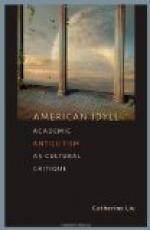Here I sit back, and words fail me. I see that year as a kaleidoscope of one joyful day after another, each rushing by and leaving the memory that we both always had, of the most perfect year that was ever given to mortals on earth. I remember our eighth wedding anniversary in Berkeley. We had been going night after night until we were tired of going anywhere,—engagements seemed to have heaped up,—so we decided that the very happiest way we could celebrate that most-to-be-celebrated of all dates was just to stay at home, plug the telephone, pull down the blinds, and have an evening by ourselves. Then we got out everything that we kept as mementos of our European days, and went over them—all the postcards, memory-books, theatre and opera programmes, etc., and, lastly, read my diary—I had kept a record of every day in Europe. When we came to that year in Heidelberg, we just could not believe our own eyes. How had we ever managed to pack a year so full, and live to tell the tale? I wish I could write a story of just that year. We swore an oath in Berlin that we would make Heidelberg mean Germany to us—no English-speaking, no Americans. As far as it lay in our power, we lived up to it. Carl and I spoke only German to each other and to the children, and we shunned our fellow countrymen as if they had had the plague. And Carl, in the characteristic way he had, set out to fill our lives with all the real German life we could get into them, not waiting for that life to come of itself—which it might never have done.
One afternoon, on his way home from the University, he discovered in a back alley the Weiser Boch, a little restaurant and beer-hall so full of local color that it “hollered.” No, it did not holler: it was too real for that. It was sombre and carved up—it whispered. Carl made immediate friends, in the way he had, with the portly Frau and Herr who ran the Weiser Boch: they desired to meet me, they desired to see the Kinder, and would not the Herr Student like to have the Weiser Boch lady mention his name to some of the German students who dropped in? Carl left his card, and wondered if anything would come of it.
The very next afternoon,—such a glowing account of the Amerikaner the Weiser Boch lady must have given,—a real truly German student, in his corps cap and ribbons, called at our home—the stiffest, most decorous heel-clicking German student I ever was to see. His embarrassment was great when he discovered that Carl was out, and I seemed to take it quite for granted that he was to sit down for a moment and visit with me. He fell over everything. But we visited, and I was able to gather that his corps wished Herr Student Par-r-r-ker to have beer with them the following evening. Then he bowed himself backwards and out, and fled.




